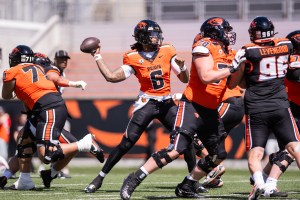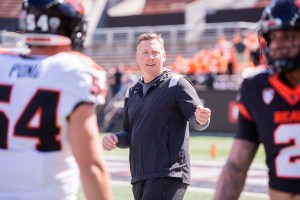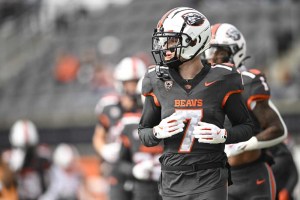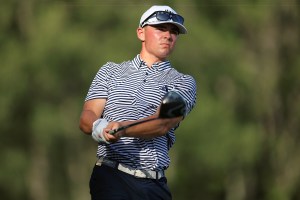TrackTown USA’s Vin Lananna leads way to 2016 Olympics
Published 12:00 am Tuesday, August 4, 2015
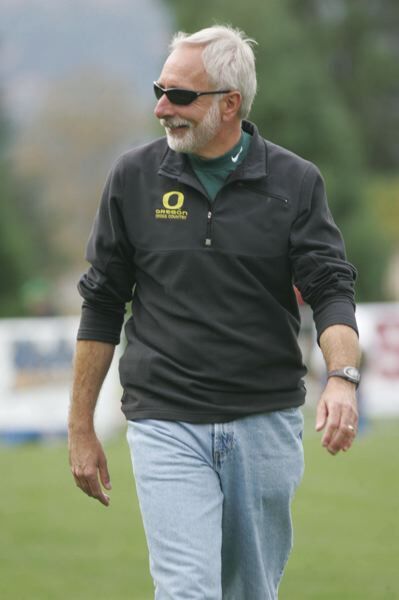
- TrackTown USA head Vin Lananna runs every day and says he is obsessed with his job, which he describes as my hobby.
EUGENE — A maxi-poster-size photo of Bill Bowerman — wearing a green cowboy hat, presumably at his ranch in Fossil late in life — nearly covers one wall of Vin Lananna’s office at the University of Oregon’s Casanova Center.
Trending
“I only met Bill once, a brief encounter, not even five minutes, when I was at Dartmouth and he was retired in the early ’80s,” Lananna says. “I always was intrigued by the number of things he did and the stories his guys have told through the years.
“I know a lot of them — guys like Geoff Hollister and Jeff Johnson and Nelson Farris and of course Phil Knight. Listening to all of their insights to Bill … pretty impressive with all the dimensions he had.”
Some day, track and field nobility may speak of Lananna in such reverential terms.
Trending
Lananna joins Bowerman in a select fraternity — as head coach of the U.S. Olympic men’s track and field team in 2016.
Bowerman, who died at age 88 in 1999, was Oregon’s track coach from 1948-72 and served as U.S. Olympic coach in ’72. Lananna, who served as the Ducks’ coach from 2005-12, now divides his time between his job as associate athletic director in charge of track and field operations at UO and as president of TrackTown USA, promoting the sport in the state and the U.S.
Lananna, 62, considers the selection as U.S. Olympic coach as the greatest honor in his storied career.
“Absolutely,” he says. “There are not too many opportunities to be selected for a position like that. And,” he says, gazing at the Bowerman photo, “to follow in that guy’s footsteps is really cool. I’m honored to do it.”
The Olympic position is more administrating than coaching of the individual U.S. athletes.
Says Lananna: “I would describe it as a facilitator and managing a lot of different groups — personal coaches, athletes, trainers, medical staff, all of the people who impact the performances of the athletes.”
In 2012, the U.S. set a goal of 30 track and field medals at the London Games. The Americans came away with 28. Lananna isn’t talking numbers for next year at Rio de Janeiro.
“It’s always to win as many medals as we possibly can,” Lananna says. “But I like to talk about things I have some control over. My specific goal is that my staff and I do everything we can so these athletes have everything they need to perform at their best.”
Lananna, who has never been to Rio de Janeiro, says he expects to visit there twice before the Games.
“I need to go there sometime this fall to get myself acclimated to what is there geographically,” he says. “Then I’ll go there again in an official capacity once they have the logistics down and we have our training camp together.”
Lananna, who has coached at such institutions as Dartmouth, Stanford and Oregon, considers himself as much an educator as a coach.
“It’s all about the life lessons you teach,” he says. “I’m a coach/educator, but at the heart of it, you’re always a teacher, a mentor, a coach.”
Lananna recently received an email of congratulations from his college coach at Division II C.W. Post in Brookville, N.Y., Roy Chernock, who is still coaching high school track in Florida in his late 80s.
Says Lananna: “I sent an email back saying, ‘Good students listen to good mentors. Thanks for being that for me.'”
Lananna was a “role player” as a distance runner at C.W. Post in the early ’70s, captain of the school’s cross country team that finished fourth at nationals his senior year. When he entered the coaching field four decades ago, could he have imagined one day being Olympic team coach?
“Not at all,” he says with a laugh. “In 1975, my senior year in college, I was hurt and had to find something to do in the spring. So I coached a high school team in Long Island, coaching some field events I knew nothing about.”
Lananna returned to his alma mater the next year as head cross country coach. Over the years, he has served as assistant AD and head track and cross country coach at Dartmouth, as head track and cross country coach at Stanford (from 1992-2003) and then two years as AD at Oberlin (Ohio) College for two years before arriving in Eugene in 2005.
During his pre-Oregon years, Lananna coached the U.S. team at the 1990 and ’96 World Cross Country Championships, was U.S. coach at the 1994 Junior World Track and Field Championships, was U.S. distance coach at the 1999 World Championships and was U.S. men’s distance coach for the 2004 Olympics at Athens.
While at Oregon, Lananna coached the Ducks to a pair of men’s NCAA cross country championships (2007 and ’08) and one women’s title (2012), the men to one NCAA indoor track and field crown (2009) and the women to three (2010-12). The UO men finished tied for second at the NCAA track and field meet in 2009; his women placed second four straight years (2009-12). Lananna also served as men’s head coach for the U.S. team at the 2011 IAAF World Championships in Daegu, South Korea.
Lananna has been the driving force behind TrackTown USA’s successful bids to host the 2008, ’12 and ’16 U.S. Olympic trials, the NCAA championships in 2010 and from 2013-21, the 2011 and ’15 USATF national championships, the 2014 World Junior Championships and — “the crown jewel,” in his words — the 2021 World Championships. As TrackTown USA president, he is also bringing the U.S. and World Indoor Championships to Portland’s Oregon Convention Center next year.
Why did Lananna decide to leave his coaching position at Oregon in 2012?
“It’s simple,” he says. “It was always part of the plan. I was in coaching longer than I ever anticipated. I was hired for (the TrackTown USA presidency) in 2005. When I came, the vision was to set Oregon up to be the most dominant team to be assembled in the history of the NCAA. I felt like we’d set the foundation for that. We’d put a staff together, we had the facilities, we had the meets. All of that was in place.
“My overall goal was to assure that our sport of track and field in the U.S. — which was really dependent upon the Eugene community — was sound. There were more things I wanted to do. I couldn’t do justice to it if I was focusing on coaching. The best way to make sure it was all rolling was to put my fingerprints on what we were trying to do.
“The U of O’s performances are critical to the success of the sport. As arrogant as that may sound, it’s true, because Oregon occupies this very special position in the world of track and field, and so does Hayward Field. The performances by the U of O are enhanced by the TrackTown piece, and the TrackTown piece is enhanced by the U of O. Once we had everybody in place to do a great job, it was time to focus on Part Two.”
Has the post with TrackTown USA been fulfilling?
“Yes,” Lananna says. “It’s one of these nebulous things. It’s hard to create the metrics for how it’s working. The Oregon teams are doing great. They’re winning. The various events we put on are going phenomenally. Tom Jordan’s Prefontaine Classic is rolling. We have record crowds for our high school state meets. The World Juniors, the World Indoors, and then the World Championships in 2021 … it’s a lot more work than I ever had anticipated, but we have some phenomenal stuff going.”
Many people have contributed to Oregon’s track and field successes over the years, but for now, Lananna is the man who is stirring the drink. It’s part of his DNA.
“I’m a person who likes to look over the horizon and see what can be done and then try to put into place a system to get there,” he says. “I like to read the last chapter first.”
Lananna wants Oregon track and field to do well, but he wants the sport to thrive nationally, too. He has mixed feelings about where it is on the American sports calendar today.
“We dominate the world in terms of medal counts,” he says. “We have some of the most vibrant meets, including the Pre Classic. Our NCAA TV viewership is at record numbers. Over the last 20 years, the performances of the American athletes have gotten better.
“But I look at the lack of appeal track and field has to the average (U.S.) sports fan. It’s a challenge, but it creates a tremendous opportunity. That’s what TrackTown is focused on. What is it that will bring the sports fan to track and field? This state has a tremendous ability to advance the sport for the right reasons. If we can set that model in the state of Oregon, the sky’s the limit.”
Lananna is creating a “Tracktown Summer Series” in 2016 that will feature dual meets between teams representing cities throughout the country, culminating in a national championship event at Hayward Field. Portland is expected to be the site of one of the dual meets, which will be streamlined to be more fan-friendly.
“We’ll be able to roll out the specific plans later this summer,” he says. “We’re very close to being able to talk about something that will take the TrackTown model to the rest of the country in the high visibility areas. What I hope it will do is generate interest in the sport.
“Track has to re-invent itself. We have to get our children, and our children’s children, involved in such an easily accessible sport. If you take somebody to a track meet and it drags on for six hours, that’s not the way it works now.
“In 2021, the world is coming to Eugene. We need to have a fan base that can’t wait for the World Championships to happen. I’m very optimistic that our state will embrace that with both arms and create the atmosphere that, when the athletes arrive, it will be like no other experience they’ve had.”
Portland will play host to the U.S. Indoor Championships and the World Indoor Championships in the space of one week next March.
“The U.S. Indoor plans are really rolling,” Lananna says. “We’ll see a tremendous amount of visibility in 60 days. Our second ticket launch is coming up. The track is being assembled now and will soon be shipped to Portland from Estonia. We’ll construct it, and it’s possible we’ll have an opportunity to do some stuff on that track before the U.S. Indoors.”
The World Championships are six years away. Lananna will be 68 at that point. Wouldn’t that be a perfect time to ride off into the sunset in retirement?
“I haven’t had time to even think about that,” he says with a laugh.
Lananna runs every day — he’s working on a streak that exceeds 900 straight days — but doesn’t have many hobbies.
“I’m pretty obsessed with what I do for a living,” he says. “It sounds like a cliche, but I’ve really never worked. I do this because I like it. Track and field is my hobby. I don’t play golf. The only other thing I’ve been motivated about lately is my 2-1/2-year-old grandson.”
Since his Olympic coaching nomination, Lananna has been besieged by congratulatory messages through notes, email and phone calls.
“I’m most proud of the relationships I’ve had with athletes through the years,” he says. “I’ve had some spectacular men and women at the institutions I’ve been. They’ve done a great job. When I hear back from them … I’m proud of the fact we have that connection.
“And the relationships I’ve built with my colleagues over the years. I hired Robert Johnson (his successor as Oregon’s head coach), and winning the NCAAs this spring was a great thing. Kentucky finished second and (the Wildcats’) coach is Edrick Floreal, who was my assistant at Stanford. Both have become great leaders in the sport. When you’re in my age category, you feel good about that.”
kerryeggers@portlandtribune.com
Twitter: @kerryeggers


